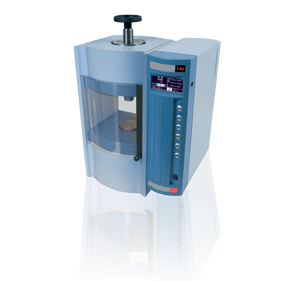A hydraulic press utilizes a hydraulic cylinder to generate a compressive force. Within this device, a plate serves as the location for sample placement during the preparation process. This article outlines the operational principle of a hydraulic press and briefly mentions some of the hydraulic presses available from XRF Scientific.
How Does a Hydraulic Press Work?
A hydraulic press works on the principle of Pascal’s law, which states that when pressure is applied to a confined fluid, the pressure change occurs throughout the entire fluid.
Enclosed within the hydraulic press is a piston that operates as a pump, exerting a modest mechanical force on a small sample area. There is also a piston with a larger area, which produces a larger mechanical force.
Advantages
Utilizing hydraulic presses, particularly for XRF sample preparation, offers several advantages. Their usage has considerably increased the speed at which XRF sample preparation can be performed. This is most apparent in hand-fed hydraulic systems, where sample switching becomes more convenient and faster.
Hydraulic presses also prove to be highly advantageous for high-volume sample preparation, thereby further expediting the sampling process.
Hydraulic presses serve as versatile instruments, suitable for preparing various XRF samples and affording operational flexibility, including variable speeds, forces, directions, and pressure settings.
Hydraulic Presses from XRF Scientific
XRF Scientific provides a variety of laboratory equipment, including hydraulic presses tailored for XRF sample preparation. The hydraulic equipment is available in diverse configurations, encompassing automatic, manual, power, and motorized presses.

Image Credit: XRF Scientific
The automatic systems are power-assisted, programmable, and controlled by microprocessors, boasting load capacities that span from 8 to 40 tons for an array of applications.
XRF Scientific's manual hydraulic press represents a hand-operated unit well-suited for the preparation of powder samples for XRF analysis, featuring an accurate pressure gauge and robust housing.
The motorized hydraulic press is power-assisted, accommodating up to 25 tons of force, enabling direct pressure adjustments, and displaying full compatibility with the dies supplied.
The power hydraulic tools, with force capacities ranging from 8 to 25 tons, are designed to meet diverse pressing needs, including those related to XRF sample preparation.

This information has been sourced, reviewed and adapted from materials provided by XRF Scientific.
For more information on this source, please visit XRF Scientific.